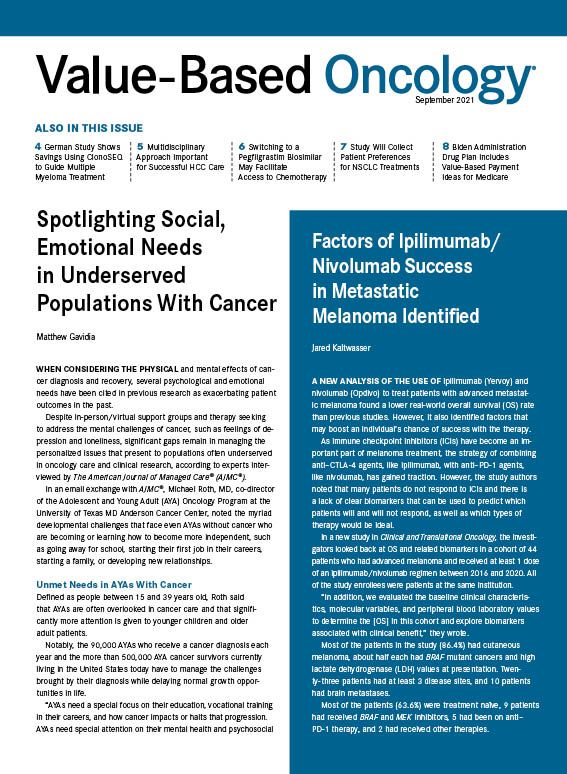- Center on Health Equity & Access
- Clinical
- Health Care Cost
- Health Care Delivery
- Insurance
- Policy
- Technology
- Value-Based Care
Switching to a Pegfilgrastim Biosimilar May Facilitate Access to Chemotherapy
Switching patients from reference pegfilgrastim to a biosimilar could lead to substantial cost savings, with potential to offset the cost of and allow for greater access to chemotherapy treatment, investigators concluded.
Converting patients from reference pegfilgrastim, either the prefilled syringe form (Neulasta) or the on-body injector (Neulasta Onpro), to a biosimilar version could lead to significant cost savings for payers and greater access to FOLFIRINOX (folinic acid, fluorouracil, irinotecan, oxaliplatin) chemotherapy for patients with metastatic pancreatic cancer, according to a recent study.
The study, published in Future Medicine, provides insight into how switching patients from the more expensive reference product to biosimilar pegfilgrastim-cbqv (Udenyca) as a febrile neutropenia prophylaxis could generate enough savings to allow for patients to have budget-neutral access to chemotherapy treatments.
“As the more affordable of the pancreatic cancer treatment regimens in most markets, the scale of expanded access to FOLFIRINOX that is achievable through the reallocation of savings from conversion to biosimilar pegfilgrastim-cbqv is significant—providing thousands of additional patients with cancer treatment on a budget-neutral basis,” wrote the investigators.
Throughout the COVID-19 pandemic, the use of pegfilgrastim has risen for patients with cancer at risk for developing febrile neutropenia, and this trend is expected to continue once the crisis has subsided. Currently, there are 4 FDA-approved pegfilgrastim biosimilars.
Although many cost-efficiency analyses are being done for multiple biosimilar products, less is known about the potential for expanded access to other medications, including chemotherapy regimens, as a result of biosimilar cost savings. All of the agents in FOLFIRINOX have generic equivalents for the treatment of metastatic pancreatic cancer.
The investigators chose to focus their research on pancreatic cancer because it is the 11th most prominent cancer in the United States and ranks fourth in terms of cancer mortality rates. It is also regularly diagnosed in late stages and has a 5-year survival rate of 3.0% in the United States.
By developing a simulation model among a panel of 2500 patients with metastatic pancreatic cancer treated with FOLFIRINOX, the investigators analyzed the effects of varying treatment duration and conversion rates to estimate cost savings and additional doses of FOLFIRINOX that could be budget neutral. The study consisted of 4 stages of analysis:
- Per-patient cost savings from converting to pegfilgrastim-cbqv across 1 to 12 cycles (up to 3 months) of prophylaxis
- Cost savings extrapolated to the patients over varying degrees of biosimilar conversion from 10% to 100% and over 1 to 12 cycles
- The number-needed-to-convert (NNC) from the reference product to the biosimilar for 1 patient to receive 1 cycle, 1 month, or 6 months of FOLFIRINOX
- The savings generated to calculate additional FOLFIRINOX cycles, months, and full 6-month regimens that could be purchased on a budget-neutral basis
The investigators combined the average sales price (ASP) and wholesale acquisition cost (WAC) of reference pegfilgrastim and pegfilgrastim-cbqv, to arrive at $4014.77 and $3439.16, respectively, for the third quarter of 2020. For 1 cycle of FOLFIRINOX for the same quarter, the total was $238.93.
Converting 1 patient from reference pegfilgrastim to the biosimilar generated savings of $575.62 for 1 cycle and $6907.41 for 12 cycles of prophylaxis. If the entire 2500-patient panel was converted, savings would jump to $1,439,043 for 1 cycle and $17,268,519 for 12 cycles.
The NNC analysis showed that 0.42 patients need to convert to the biosimilar for 1 pegfilgrastim cycle to purchase 1 additional cycle of FOLFIRINOX on a budget-neutral basis. To purchase an additional full 6-month regimen, 4.98 patients need to switch to the biosimilar.
If 100% of the panel was converted to the biosimilar across the 6-month duration, an additional 72,273 additional cycles of FOLFIRINOX could be purchased, which corresponds to 36,137 months of treatment or 6023 full 6-month regimens. If 50% of the panel converted for 6 months, 36,137 additional chemotherapy doses could be purchased, which translates to 18,068 months of treatment or 3011 full 6-month regimens.
The investigators listed the use of the blended ASP and WAC rate, the fact that ASP changes over time, the analysis of only 1 pegfilgrastim biosimilar, and the omission of costs associated with hospitalization and other treatments as limitations of the study. Additionally, costs associated with on-body injector failures were not included in the analysis.
Reference
MacDonald K, Alrawashdh N, McBride A, Abraham I. Conversion to biosimilar pegfilgrastim-cbqv enables budget-neutral access to FOLFIRINOX treatment for metastatic pancreatic cancer. Future Oncol. Published online August 12, 2021. doi:10.2217/fon-2021-0718

How Health Care Institutions Can Leverage Biosimilars to Generate Savings
August 17th 2022On this episode of Managed Care Cast, Ryan Haumschild, PharmD, MS, MBA, from Emory Healthcare and the Winship Cancer Institute, explains the evolution of biosimilar pharmacoeconomics and the different strategies that health care institutions can implement to reap the benefits of biosimilar savings.
Listen
